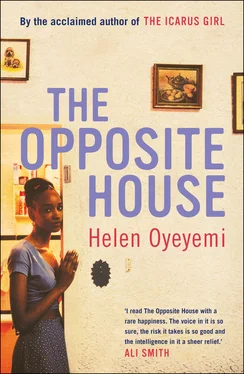Helen Oyeyemi - The Opposite House
Здесь есть возможность читать онлайн «Helen Oyeyemi - The Opposite House» весь текст электронной книги совершенно бесплатно (целиком полную версию без сокращений). В некоторых случаях можно слушать аудио, скачать через торрент в формате fb2 и присутствует краткое содержание. Год выпуска: 2008, Издательство: Bloomsbury UK, Жанр: Современная проза, на английском языке. Описание произведения, (предисловие) а так же отзывы посетителей доступны на портале библиотеки ЛибКат.
- Название:The Opposite House
- Автор:
- Издательство:Bloomsbury UK
- Жанр:
- Год:2008
- ISBN:нет данных
- Рейтинг книги:4 / 5. Голосов: 1
-
Избранное:Добавить в избранное
- Отзывы:
-
Ваша оценка:
- 80
- 1
- 2
- 3
- 4
- 5
The Opposite House: краткое содержание, описание и аннотация
Предлагаем к чтению аннотацию, описание, краткое содержание или предисловие (зависит от того, что написал сам автор книги «The Opposite House»). Если вы не нашли необходимую информацию о книге — напишите в комментариях, мы постараемся отыскать её.
The Opposite House — читать онлайн бесплатно полную книгу (весь текст) целиком
Ниже представлен текст книги, разбитый по страницам. Система сохранения места последней прочитанной страницы, позволяет с удобством читать онлайн бесплатно книгу «The Opposite House», без необходимости каждый раз заново искать на чём Вы остановились. Поставьте закладку, и сможете в любой момент перейти на страницу, на которой закончили чтение.
Интервал:
Закладка:
The temporary teaching post that Brigitte won at the University of Santa Clara was justified by the ‘rising levels of interest in political philosophy amongst students’, but really it was small-scale antagonism against the fading Batista dictatorship. Brigitte’s post was intended by the Faculty to help foster links between one nation on the path to Utopia and another. After a week’s classes, she finally did what was in her heart and disappeared.
Then, when Brigitte needed money, my Abuelo Damason said to her, ‘I’ll pay you to teach my daughters German. The German language is poetic — that is to say it is both vague and precise. Perhaps once my girls have learnt German they will all become men and go and fight for freedom and frustrated dreams.’
Apparently this grandfather of mine had a way of talking that made him sound as if he was never entirely sincere. Brigitte’s lips thinned.
Even after Abuelo Damason had managed to convince her that he had not been mocking her country’s role in the war, Brigitte still refused to teach his daughters German. My aunt Tia Dayame refused to learn German. Tia Pilar refused to learn German, and so did Tia Caridad. They all said the same thing: ‘What’s the point of learning German?’ but each of them had different reasons. The sisters were not close.
‘German is the language of ideas,’ my abuelo repeated, in an attempt to persuade Brigitte and his daughters.
‘But not of reality,’ Brigitte said, and she was sad. Chabella took up Brigitte’s copy of Der Struwwelpeter and started reading aloud Heinrich Hoffmann’s dire warning to bad children. Her beginner’s accent was jaw dropping. (Chabella can still muster that accent now. When she puts it on she sounds like an adenoidal man morphing into a frog.) Brigitte looked at her blankly. Brigitte said, ‘Do you have any idea of the meaning of those words?’
Chabella looked at an illustration; a giant in yellow trousers was dipping two squirming boys headfirst into a cauldron of ink. She said, ‘Not exactly.’
Brigitte said calmly, ‘You’ll sound better if you elongate your vowels when you see those two little dots — they’re called umlauts.’ And so Chabella’s first German lesson began.
That is the collection of things Chabella and I have decided about Brigitte. She is the only non-saintly white face in Chabella’s candle-lit display. Brigitte bought her place in Chabella’s altar with the gold-dust scarcity in Habana of red leather pumps. Brigitte put a pair under Chabella’s pillow the morning she finally left for America. And Chabella didn’t even find the pumps until she hid her face in the pillow to cry because she missed Brigitte. Brigitte had known that she would do that. When she left Chabella at the front door, Brigitte didn’t hug my Mami, but she touched her fingers to her own red lips and said, ‘This is a kiss.’ Chabella felt it the same as the gunshot. ‘Esto es un beso, moquenquen, dies ist ein Kuss,’ and then no word from Brigitte again.
Not long after she left, Batista left too — he fled Cuba. The change that everyone had promised and threatened came, and it came in the form of a military junta, which meant that uniformed men toted guns and smiled celebratory peace and did not fire in places where they could be heard. Chabella didn’t break her routine of stumbling into the one pothole on her street that was her particular bane.
When Mami speaks German she becomes wise. Glad crinkles frame her lips and eyes. Weltschmerzen, Dasein, Sitz im Leben , and so, and so, from web of thought to web of thought she departs from images and describes things unseen.
I walk back to Aaron’s with my Walkman switched on. My favourite song is sung slowly, blues about a woman who is alone and still and doesn’t understand that she doesn’t like it that way. But because the woman is patient and because she has perfect hair and because she enchants her clothes with French perfume, she sometimes gets a visit from her man, and then, oh. Then the song is poison in your ear, music to seal you in. Because when her visitor comes, the shadow song begins. Nobody has reason to cry the way someone is crying inside this song, not alone. Nobody has it inside them to climb just that note and keep ascending, they couldn’t, not even if they were crazy.
The song woman who curls her hair, she is white, I think. The singing woman, the one who makes me know that the song woman curls her hair, she is black, her voice is whisky dark. The screech in this song is bigger than either of them and it’s both of them doing it, both of them telling on each other until it seems that they fuse into one face and the piano player and his gentle backing notes are playing themselves out from a dangerous position on the screamer’s nose. But the piano player doesn’t fall into the mouth, of course. Screaming doesn’t do anything.
I rewind and replay as I walk down streets and into walls of cloth and skin and people and ‘excuse me’s and late-afternoon confusions of pavement and sky.
Once, when I was listening to this song at the bus stop, out of the corner of my eye I saw a woman staring at me, I saw a woman lift her hand to touch me, and when I looked at her it was Chabella. I pushed the headphones down and she smiled uncertainly and said, ‘I almost didn’t recognise you. But after all I thought, No, that girl looks like me.’
Another time, when I arrived at band rehearsal listening to this favourite song of mine, I lifted off my earphones gingerly and cupped my hands to my ears, expecting blood.
5 roots people
One day in Habana, the day that would end in nochebuena
(the good night, Christmas Eve)
Yemaya, in love with Cuba, went walking in La Regla, repeating after the Columbus in her mind’s eye, ‘This is the most beautiful land I have ever seen.’
The day was hot but gentle; beneath its healing steam lay granite, decrepit wood, rocks gloved in blanched sand. The harbour water caught sunlight in layered hoops of petrol-coloured dirt and tried to keep its clarity secret, but the divers told. Small, earth-brown boys kept bobbing up, their backbones hacking out of their skin, hair plastered to their heads, coin pouches around their waists rattling as they added new handfuls of slick bronze to their store.
Aya gathered up her seven skirts — blue lacing silver lacing more blue — and raced herself. She ran past irregularly spaced palm trees, looming with their tops drying out. She ran past a woman clothed in a swarm of toddlers; the woman cooked corncobs on a charcoal-heated griddle with her skirt hitched up around her knees. With her other hand, she kept her children from cooking themselves on her pan.
Yemaya didn’t even stop
(though she felt a pull and a fuzzy, bite-sized happiness like a kiss on the nape of her neck)
at the small household shrine, strung and nailed to a house’s doorway, that was meant for her. Ignored, Our Lady of Regla pouted sweet and pink from a ribboned cage of sea lavender and long-funnelled trout lilies, and cowrie shells with fluted mouths.
Aya stopped at the watchmaker’s parlour — here, a man with hair dreadlocked like a powerful man, like a babalawo , made watches and clocks, squinted over tiny, intricate mechanisms with pincers and thin magnets and hammers the size of Aya’s little finger. His clocks were not ordinary, but he sold them at carelessly cheap prices out of his living room. This watchmaker, he spoke exactly like a Cuban — but he said he was not Cuban.
Yemaya saw that, amongst old, knotted mahogany clocks with glazed faces, new clocks peeped out. Their faces were plain, mounted on block-like bases with hands of beaten brass that drove the minutes forward on their glint. Anyone who stood too close to see the time on one of these clocks felt a wafer-thin breeze from elsewhere, a colder place, a higher place. The watchmaker, a scattering of sawdust in his hair, waited for her at the counter with his fingers folded over some secret in his palm.
Читать дальшеИнтервал:
Закладка:
Похожие книги на «The Opposite House»
Представляем Вашему вниманию похожие книги на «The Opposite House» списком для выбора. Мы отобрали схожую по названию и смыслу литературу в надежде предоставить читателям больше вариантов отыскать новые, интересные, ещё непрочитанные произведения.
Обсуждение, отзывы о книге «The Opposite House» и просто собственные мнения читателей. Оставьте ваши комментарии, напишите, что Вы думаете о произведении, его смысле или главных героях. Укажите что конкретно понравилось, а что нет, и почему Вы так считаете.












